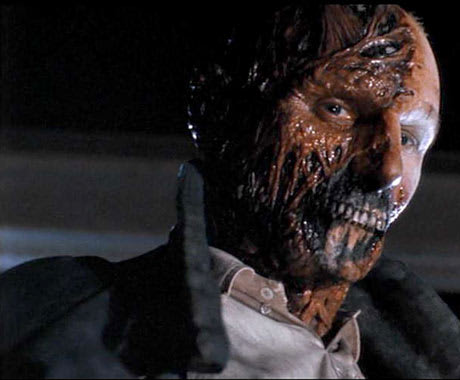Are there any b-movies anymore? The joyous pulp cinema of yesteryear has been mostly lost to massive studio misfires (ex: John Carter, Battleship) and the ironic garbage churned out by production companies like The Asylum (ex: Sharknado). But what happened to the middle ground, the studio films that didn't hinge on an opening weekend gross?
Sam Raimi's Darkman just might be the last of its kind. For one, it's a big-budget comic book movie not based on an existing property: unable to secure the rights to The Shadow, the title character of 1930s pulp novels and radio dramas, Raimi invented his own superhero. Coming off the success of the first two Evil Dead films, the director had enough clout to get the film made with studio backing. More importantly, Darkman was produced just two years before T2: Judgement Day and Jurassic Park revolutionized the industry with their use of CG. In hindsight, Raimi's homage to vintage superheroes and the techniques of old Hollywood couldn't have arrived at a better time.
In the film, Dr. Peyton Westlake (Liam Neeson) is on the brink of inventing a synthetic skin when his lawyer girlfriend (Frances McDormand) becomes entangled in the plot of a corrupt city developer (Colin Friels) and mobster Robert Durant (Larry Drake). After Westlake is disfigured and left for dead by Durant, he turns to his synthetic skin to create masks and infiltrate the local mob for revenge.
Immaculately preserved on Blu-ray by the reliably terrific Shout! Factory, the various green screens, prosthetics and other vintage touches look better in high-definition than a film from 1990 should. In the slew of bonus features, Neeson reflects on his first starring role and, contrary to the convention of most home releases, McDormand speaks candidly of her on-set disagreements with the director. Raimi is conspicuously absent, with the commentary track left to director of photography Bill Pope who, having reteamed with Raimi for the Spider-Man trilogy in the interim, gives unique insight into the film.
Where Raimi does appear is in the promotional clips from around the film's release. Captured on video, speaking with authority on the traditions of Hollywood, it's as though the director, like the film itself, exists just outside of time.
(Shout! Factory)Sam Raimi's Darkman just might be the last of its kind. For one, it's a big-budget comic book movie not based on an existing property: unable to secure the rights to The Shadow, the title character of 1930s pulp novels and radio dramas, Raimi invented his own superhero. Coming off the success of the first two Evil Dead films, the director had enough clout to get the film made with studio backing. More importantly, Darkman was produced just two years before T2: Judgement Day and Jurassic Park revolutionized the industry with their use of CG. In hindsight, Raimi's homage to vintage superheroes and the techniques of old Hollywood couldn't have arrived at a better time.
In the film, Dr. Peyton Westlake (Liam Neeson) is on the brink of inventing a synthetic skin when his lawyer girlfriend (Frances McDormand) becomes entangled in the plot of a corrupt city developer (Colin Friels) and mobster Robert Durant (Larry Drake). After Westlake is disfigured and left for dead by Durant, he turns to his synthetic skin to create masks and infiltrate the local mob for revenge.
Immaculately preserved on Blu-ray by the reliably terrific Shout! Factory, the various green screens, prosthetics and other vintage touches look better in high-definition than a film from 1990 should. In the slew of bonus features, Neeson reflects on his first starring role and, contrary to the convention of most home releases, McDormand speaks candidly of her on-set disagreements with the director. Raimi is conspicuously absent, with the commentary track left to director of photography Bill Pope who, having reteamed with Raimi for the Spider-Man trilogy in the interim, gives unique insight into the film.
Where Raimi does appear is in the promotional clips from around the film's release. Captured on video, speaking with authority on the traditions of Hollywood, it's as though the director, like the film itself, exists just outside of time.
